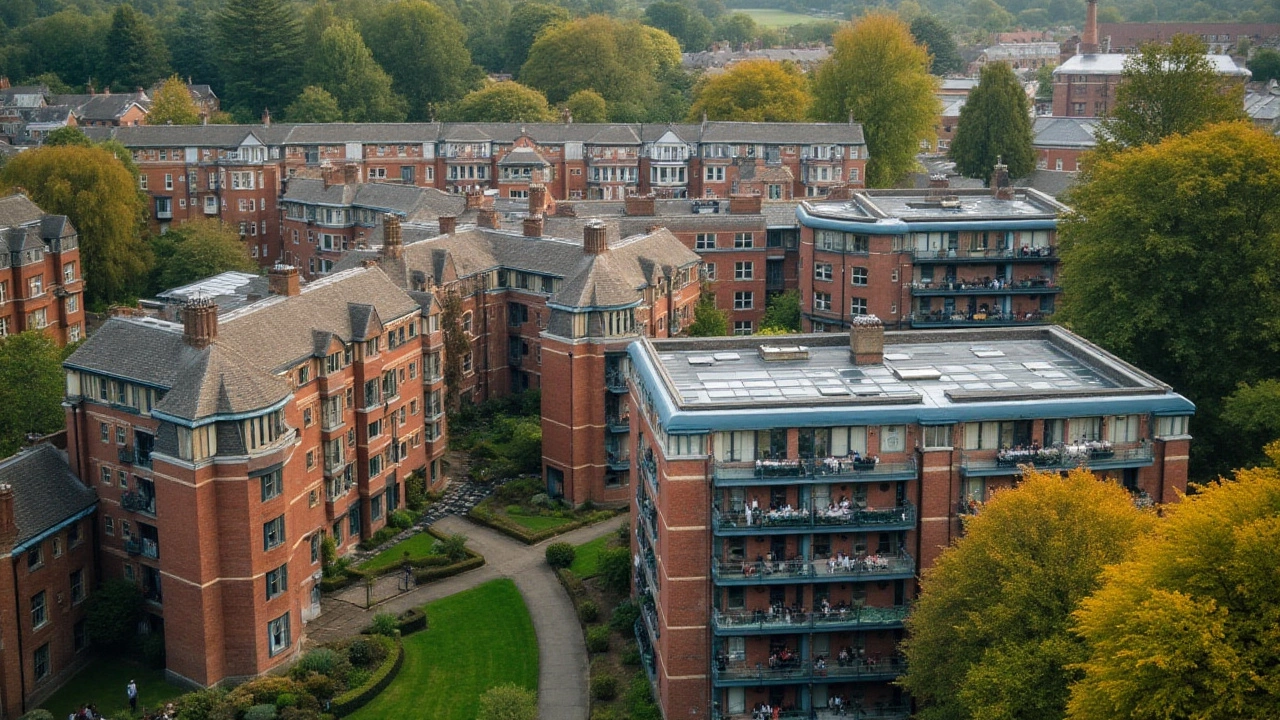Finding the perfect place to live while attending college is more important than many students might realize. It's not just about having a roof over your head; it's about creating an environment that supports your academic goals and personal growth.
Student accommodation comes in many shapes and sizes, each with its own set of benefits and challenges. From traditional dormitories to off-campus apartments and shared housing, the choices are varied. Understanding these options can help students make informed decisions that cater to their lifestyle and preferences.
This article dives into the types of housing available for students, offering a comprehensive look at what each option entails. We'll also examine key factors students should consider when searching for accommodation and share practical tips to aid in finding the right fit for a fulfilling and successful college experience.
- Understanding Student Needs
- Types of Accommodation
- Factors to Consider
- Tips for Choosing the Right Place
Understanding Student Needs
Deciding on the right student accommodation is much more than just a transaction; it's a careful consideration of each individual's unique needs as they embark on this new chapter in their lives. Recognizing these needs can significantly contribute to a student's success both academically and personally. First and foremost, students need a space that supports their academic pursuits. This means having access to a reliable internet connection for research and assignments, a quiet study area to focus on their coursework, and often a communal space for group discussions or projects. Without these essentials, students may find themselves struggling to keep up with their academic workload.
Beyond academics, students crave a sense of community and belonging. Moving to a new city or even a different country for university can be daunting, and having a support network is crucial. Student housing that encourages interaction, whether through shared living spaces or organized social events, can provide a much-needed sense of home away from home. Safe living conditions are another non-negotiable for students. Parents and students alike place great emphasis on security features such as CCTV, secure entry systems, and even on-site staff to ensure peace of mind. Proximity to the campus is often a priority, too, avoiding lengthy commutes that can eat into valuable study time.
Financial considerations play a massive role in determining suitable accommodation. Students generally operate on a tight budget, often supported by student loans or part-time jobs. Affordable housing options that do not compromise on essential amenities are greatly sought after. This brings in the question of value for money, where students weigh what various accommodations offer vis-à-vis their monthly or annual costs. Nutrition is also a vital aspect that is sometimes overlooked in the student housing decision process. Facilities to cook or adequate meal plans are critical for students to maintain a healthy lifestyle. Grabbing unhealthy snacks on the go might be convenient but having a kitchen to prepare meals can be a healthier and more budget-friendly option.
University living often serves as a trial run for students who are living independently for the first time. Therefore, accommodations that teach life skills such as cleaning, budgeting, or simple cooking can be incredibly beneficial. It's about striking the right balance between independence and support. Anxiety and stress are common companions for many students, which is why a nurturing environment becomes vital. The accommodation choice should reflect a stress-free zone that offers relaxation and downtime alongside the hubbub of academic life. The surroundings, whether it's proximity to nature, recreational facilities, or cultural hotspots, can greatly enhance a student's university-life experience.
According to a study by the National Union of Students, quality student accommodation significantly boosts a student's chances of academic success and personal well-being during their university years.
In the ever-evolving landscape of college housing, technology is emerging as an essential component. From virtual open days to apps that offer real-time updates on accommodation availability, students today have tools and resources that can make their housing search more efficient. But beyond technologically advanced systems, the human aspects of visiting, feeling the place, and meeting potential roommates still hold a key position in the decision-making process. As students evolve in their preferences and priorities, so too must the design and facilities of their accommodation solutions. With thoughtful planning and thorough research, students can find housing that aligns perfectly with their needs, maximizing their university experience in every way imaginable.

Types of Accommodation
When it comes to finding the right student accommodation, there are several paths a student can take. Understanding these options is essential for selecting a living situation that aligns with one's lifestyle and academic needs. Let's start with the classic choice for many freshmen - the dormitory or residence hall. These halls, typically located on campus, offer a convenient and immersive university experience. Living in a dormitory means being at the heart of all campus activities, which can be a boon for social engagement but may also come with certain limitations such as restricted personal space.
One of the primary attractions of dorms is their proximity to key facilities such as libraries, gyms, and cafeterias. Many students appreciate the ease of rolling out of bed for early morning lectures without the worry of commuting. However, it's important to weigh these benefits against the challenges. Sharing a room with a stranger can be both a bonding experience and a test of patience. Resident advisors often enforce certain rules to maintain order, which might feel restrictive for those seeking independence. For some, dormitory life strikes the perfect balance between academic focus and social exploration.
Moving on to off-campus apartments, these are a staple for those seeking more autonomy. With a private apartment, students experience a greater sense of independence and privacy, often at the cost of a longer commute. Unlike dormitories, apartments allow customization of one's living environment, providing the opportunity to create a comfortable space tailored to individual tastes. However, this choice comes with responsibilities, such as managing monthly budgets for rent, utilities, and groceries. The freedom of apartment living can greatly enhance self-reliance, a crucial skill as students transition into adulthood.
A trend that has been gaining traction is shared housing. This option bridges the gap between dormitory life and independent living. In shared houses or flats, a group of students cohabitate, splitting the rent and utilities among them. This arrangement enables communal living without the institutional feel of a dorm. It allows for social connection within a smaller, more personal setting, often leading to lifelong friendships. According to a study by the University of York, 75% of students who chose shared housing reported a positive experience in balancing academic and social commitments.
Modern universities increasingly offer hybrid accommodations, blending elements of traditional dorms with apartment perks. These might include apartment-style suites within campus buildings, providing the best of both worlds. Such options often come at a premium but are popular for providing a supportive yet semi-independent environment. When choosing student housing, the most important factors often include location, cost, and amenities. As colleges diversify their accommodation offerings, understanding these types of housing can help students make informed decisions that enhance their university journey.

Factors to Consider
Choosing the right student accommodation involves weighing several crucial elements that can significantly impact a student's academic and social life. First and foremost, location is a major factor. Being close to your university can save time and transportation costs, but living a bit further might offer more quiet and potentially cheaper options. It's also worth considering the surrounding neighborhood. Ensure it’s safe, has good amenities, and offers a social vibe that can enhance your university experience.
Next, consider the cost of the college housing. Budget is often a primary concern for students, so it’s important to include both rent and additional expenses like utilities, internet, and potential maintenance fees in your calculations. Some accommodations might look cheap initially, but hidden costs can tip the balance. Typically, university dormitories charge an all-inclusive fee, which simplifies budgeting. However, off-campus options might require more financial planning.
"When deciding on accommodation, look for a place that not only suits your budget but also your lifestyle." - University of Auckland Housing Officer
The facilities provided with the accommodation are also worth scrutinizing. Modern accommodations often offer amenities such as study rooms, laundry facilities, gyms, and social spaces. These can greatly enhance your daily life, providing convenience and saving costs in the long run. Don't forget to check the quality of essential utilities like heating, cooling, and internet, which are vital during study sessions or relaxation times.
Lastly, consider the type of community or roommate culture. Living on campus in dorms often provides a built-in social structure, ideal for first-year students keen on making new friends. On the other hand, university living off-campus might provide more independence and the opportunity to live with friends. It's also important to gauge your personal living preferences: some people thrive in lively environments, while others need quiet spaces to concentrate.
Personal and Academic Support
Added support can make a substantial difference in a student’s life. Many universities provide on-site support facilities that can help manage stress and provide academic assistance. If you struggle with academic pressure or need personal counseling, having access to these services within your accommodation can be a lifeline. Consider exploring student reviews and testimonials to gain insight into how effectively these services are delivered where you plan to live.
- Proximity to Campus: How close is the accommodation to campus facilities?
- Budget: Is the price within your financial means, including hidden costs?
- Amenities: Are there essential facilities like study areas and internet?
- Community: Does the housing offer a supportive and social atmosphere?
In conclusion, taking the time to carefully weigh these factors will contribute significantly to a student’s overall experience, ensuring not only academic success but also personal happiness and growth during these pivotal years.

Tips for Choosing the Right Place
Choosing the right student accommodation is an important decision that can profoundly impact your college life. Start by assessing your personal needs and preferences because what works for one student might not be the best for another. Are you someone who thrives in social settings or do you need a quieter environment to focus on your studies? Understanding your own lifestyle can help you determine whether a dormitory, an off-campus apartment, or shared housing is the most suitable option.
Once you have a good understanding of your personal preferences, consider your budget. Living costs can vary significantly depending on the type of accommodation and its location. For instance, living in the heart of the city might be exciting but comes with a heftier price tag compared to options a little distance away. Don’t forget to include utilities, internet, and any hidden costs in your budgeting considerations. As Confucius said,
"The man who moves a mountain begins by carrying away small stones."This reminds us that careful planning can simplify even daunting tasks like budgeting.
Another key factor is proximity to your college. Close proximity can save you commuting time, allowing you to spend more time on studies or leisure activities. However, sometimes the nearest option may not offer the best facilities or match your lifestyle needs. Thus, weighing convenience against quality and amenities is crucial.
Amenities play a significant role in choosing the right place as well. Every student has different needs, but common priorities might include access to a gym, study spaces, laundry facilities, and even a reliable internet connection. You should list which amenities are must-haves and which ones you could compromise on.
Safety should not be underestimated either. Check the crime rate of the area and research the security measures in place at your potential housing. Knowing there is a secured entrance or a vigilant neighborhood watch can provide peace of mind. Lastly, don't hesitate to reach out to current residents or check online reviews to get an insider perspective. Seeing what others have experienced can be incredibly enlightening.
With all these factors in mind, making an informed choice becomes much simpler. To help with your decision, consider creating a checklist of these essential criteria as you assess different accommodations. Not only will a checklist keep you organized, but it will also ensure that you don’t overlook any crucial factors during your search.
